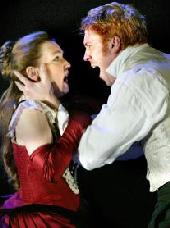SEARCH
REVIEWS
FEATURES
NEWS
Etcetera and
Short Term Listings
LISTINGS
Broadway
Off-Broadway
BOOKS and CDs
OTHER PLACES
Berkshires
London
LA/San Diego
Philadelphia
Elsewhere
QUOTES
On TKTS
LETTERS TO EDITOR
FILM
LINKS
MISCELLANEOUS
Free Updates
Masthead
Writing for us
A CurtainUp  London Review
London Review
 London Review
London ReviewPillars of the Community
by Neil Dowden
|
There's not much value in a town propped up by lies
---- Lona
|
 Lesley Manville as Lona Hessel and Damian Lewis as Karsten Bernick
(Photo: Simon Annand) |
A relatively early work, written between Peer Gynt and A Doll's House, Pillars of the Community examines ethical problems such as the corrupting nature of materialism and the inequitable treatment of women, while attacking hypocritical and repressive bourgeois values. Although it is somewhat plot-heavy and takes a little while to catch fire, Adamson skilfully accentuates the humour and ambiguities in the story.
Set in a small Norwegian seaport in the 1870s, the action focuses on the double life of shipping entrepreneur Karsten Bernick (Damian Lewis). His public image is one of a highly successful and respected businessman and philanthropist, who has already created much wealth both for himself and for the town, and is determined to bring (or drag) everyone even further into the modern industrial world.
But the private reality of this pillar of the community is somewhat different. Fifteen years ago he let his brother-in-law Johan Tonnesen (Joseph Millson) take the blame for an illicit affair and possible theft. Now he and his associates have used insider dealing to profit from a railway line which is supposed to benefit the citizens, and he is risking people's lives by insisting his workmen put to sea a ship that is unseaworthy.
The skeletons in Bernick's cupboard are in danger of being released, however, as Tonnesen and his half-sister Lona Hessel (Lesley Manville) have just returned from America, with the former now wanting to clear his name so he can marry a local girl, and the latter, who loves Bernick but was overlooked in favour of a wife with money, trying to awaken his conscience.
What develops is a sort of thriller, as we wait in suspense for the ugly truth of Bernick's secret life to be exposed. But as always with Ibsen, the moral issues are complex and subtle, as Bernick is not presented as a dastardly villain but as a charismatic man who really believes he is acting out of civic duty rather than self-interest. For him the ends justify the means, so sacrificing the livelihoods (or even lives) of individuals is acceptable if it benefits the economic well-being of the majority: that is progress.
It is fascinating that even then America could be regarded as the unacceptable face of capitalism, rather than as a land of opportunity, though again Ibsen's attitude is ambivalent as it seems Tonnesen and Lona have found more freedom and equality there than in the claustrophobic and sanctimonious atmosphere of their home town.
Director Marianne Elliott has elicited nicely modulated performances from the cast. Damian Lewis's Bernick is a plausibly attractive figure capable of great ruthlessness, who deceives himself as much as others. Lesley Manville excels as the free-spirited Lona, the first of Ibsen's New Women, and Joseph Millson makes an ardent Tonnesen.
Rae Smith's set becomes progressively barer as Bernick has less and less cover to hide behind, like Peer's famous layers of onion being stripped away to reveal the naked truth.
|
PILLARS OF THE COMMUNITY
Written by Henrik Ibsen in a new version by Samuel Adamson Directed by Marianne Elliott Starring: Damian Lewis, Lesley Manville, Joseph Millson With: Geraldine Alexander, Michelle Dockery, Brid Brennan, Michael Thomas, Justin Salinger, David Baron, Cornelius Booth, Ita O'Brien, Michael Gould, Annabel Leventon, Tom Marshall, Pamela Merrick, Simon Molloy, Paul Moriarty, Nathan Rimell, Jennifer Scott-Malden, Jack Stanley, Una Stubbs, Kirsty Wood, Hugh Wyld Set Design: Rae Smith Lighting: Chris Davey Sound: Ian Dickinson Music: Olly Fox Running time: Two hours 50 minutes including one 20 minute interval A Royal National Theatre production Box Office: 020 7452 3000 Booking until 4th February 2006 in repertory with The History Boys Reviewed by Neil Dowden based on 1st November performance at Lyttelton Theatre, Royal National Theatre South Bank, London SE1 (Rail/Underground: Waterloo) |





